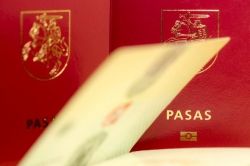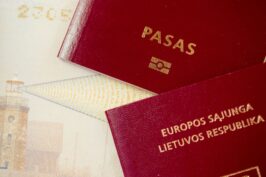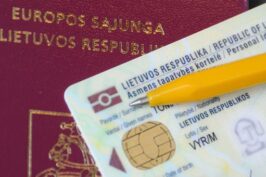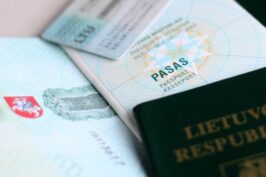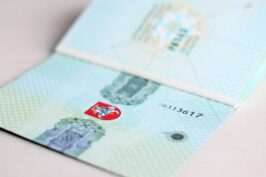- Home
- Lithuanian citizenship for persons who emigrated from Lithuania to South Africa, and for their descendants
Lithuanian citizenship for persons who emigrated from Lithuania to South Africa, and for their descendants


Since the end of the 19th century, Lithuania has been one of the Eastern European countries providing the largest number of emigrants to the World.
Lithuania has experienced four waves of emigration therefrom:
- economic emigration at the end of the 19th century and at the beginning of the 20th century;
- Emigration from Lithuania during the period 1920-1940;
- Emigration of political refugees who fled Lithuania at the end of World War II (Displaced Persons);
- Contemporary emigration from Lithuania.
A large number of residents emigrated from the territory of Lithuania to the present South African Republic at the end of the 19th century and at the beginning of the 20th century. Frequently, such emigration was influenced by economic reasons, as well as by ideological, political and historical motives: Czarist policy of Russification, growing national movement, defeat of the Revolution in 1905, wars, etc.
During the period of Independence of Lithuania (1918-1940), Lithuania experienced the second huge wave of emigration. The causes of such emigration were also mostly economic, but in certain cases historical and political.
In 1918–1940, after introduction of immigration quotas in the United States of America, the hugest flow of emigrants from Lithuania turned to South America. Lithuanians comprised the majority of emigrants, Jews were the second. The most part of emigrants of Jewish nationality departed to Palestine and the present South African Republic.
During the period 1920–1940, 102.511 residents emigrated from Lithuania, wherefrom 30.869 moved to the United States of America, 24.982 – to Brazil, 16.794 – to Argentina, 7.942 – to Canada, 4.437 – to Uruguay, and the rest 5.264 departed to other countries. 7.215 of all emigrants of Lithuania departed to the South African Republic, and 5.008 – to Palestine. The vast majority of those who departed to the South African Republic and Palestine were of Jewish origin. During years 1923–1939, approx. 25.000 Jews left Lithuania. During the period of 1920–1940, 7.200 Jews moved to the territory of the present South African Republic, and 5.000 Jews departed to Palestine. On the 4th decade of the 20th century, the emigration of Jews would have been much greater, but it was hindered by emigration restrictions in the United States of America and other countries, and by the policies of the English administration that restrained Jewish emigration to Palestine. The economic situation of the state was extremely difficult, at that time it was risky to set up a business, therefore, Jewish people emigrated to Palestine and the present South African Republic. The founders of the Jewish Community in the South African Republic were Jews who arrived there from Lithuania in the 19th century. In the South African Republic, the majority of Jews were comprised of aliens from Kaunas governorate. Currently, about 80 per cent of Jews in the South African Republic are Litvaks, i.e. Jews who came from Lithuania. More than a half of Litvaks in the South African Republic arrived from Panevėžys, Rietavas, Palanga, Joniškis and Šiauliai. The history of Lithuania’s Jews (Litvaks) reaches the early Middle Ages. A larger number of Jews arrived to the present territory of Lithuania at the end of the 11th century, while running from persecution of Jews during the period of Crusades, local massacre of Jews and exiles from German-speaking territories. At first, they moved to lands inhabited by Slavic people, and then reached Lithuania.
At the end of World War II, Lithuania has experienced the third wave of emigration, when political refugees started to depart from Lithuania. Reasons of such emigration were mainly political and historical, namely, World War II, consequences thereof, occupation of Lithuania. Lithuanians who forcibly fled Lithuania receded to camps for refugees, wherefrom they did not come back to the occupied homeland. These persons were forced political expatriates. After World War II, most Lithuanians settled down in German DP camps, also, in Austrian DP camps, where political refugees were protected by international organizations UNRA and IRO, which took care of the relief, placement of war refugees and later on of their further emigration. All persons who moved from their countries were named by the term Displaced Persons.
The Lithuanian Jewish Community was almost completely destroyed during the Holocaust in Lithuania. Due to the Jewish Holocaust during World War II, Lithuania has lost more than 90 per cent of its Jewish community.
After Restoration of Independence of Lithuania until now, Lithuania has experienced emigration influenced by economic reasons.
Persons who emigrated from Lithuania used to acquire citizenship of foreign state, whereas their children, grandchildren and great-grandchildren in most cases used to become non-Lithuanian citizens. It should be noted that, in accordance with Lithuanian legislation, citizenship of the Republic of Lithuania can be reinstated without renouncing the present citizenship of foreign state (dual citizenship) for persons, who held Lithuanian citizenship before 15 June 1940 and departed from Lithuania before 11 March 1991, as well as for descendants of such persons (children, grandchildren, great-grandchildren).
In such case, in order to reinstate Lithuanian citizenship without renouncing the present citizenship of another state, the following main circumstances must be proved:
- Lithuanian citizenship until 15 June 1940;
- Departure from Lithuania before 11 March 1990;
- Other circumstances (family relationship, change of name, surname, etc.).
It is established in the Law on Citizenship of the Republic of Lithuania that persons who held Lithuanian citizenship before 15 June 1940, and their descendants, who have not acquired Lithuanian citizenship before the entry into force of this law, shall have an indefinite right to reinstate Lithuanian citizenship, irrespective of whether the country of habitual residence thereof is Lithuania or another state.
Article 7 of the Law on Citizenship of the Republic of Lithuania provides for cases when the Lithuanian citizenship may be reinstated without renouncing the present citizenship of foreign state. It is established in this Article that a citizen of the Republic of Lithuania may be a citizen of another state at the same time, provided he is a person who fled the Republic of Lithuania before 11 March 1990, or is a descendant of such person.
MIGRATION LAW CENTER
